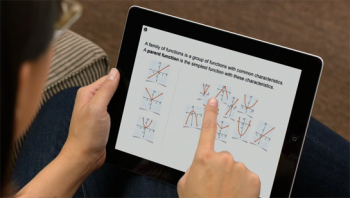Apple today announced iBooks Author and iBooks 2, free applications that let educational publishers and teachers create and market K-12 textbooks and course materials for the iPad. Apple's move had been expected, what with rumors circulating earlier this month that Apple would debut an e-textbook initiative at the New York City event it hosted Thursday morning. One analyst called the announcements "a 70% solution" that could change education, if ever, only in the long run.In an hour-long presentation, Apple executives demonstrated iBooks 2 and iBooks Author, announced partnerships
with several major textbook publishers, touted the benefits of digital books, and said it was expanding iTunes U -- until now a service primarily used for sharing college-level lecture videos -- to let teachers of all grades build syllabi and interact with students."Education is deep in our DNA," said Philip Schiller, head of Apple's marketing, as he kicked off the event. "We bring the same energy and passion we put into every product we make into our education business as well."
Apple released an updated iBooks app to the App Store today that offers several new features, including highlighting, note-taking and automatic generation of study cards for textbooks, said Roger Rosner, the leader of Apple's productivity application group.
"These are gorgeous books...[that] have some really cool, rich, engaging interactive experiences," Rosner said as he showed several textbooks displayed in iBooks 2.
Contrary to earlier speculation, Apple did not offer iBooks 2 for Mac OS X, so the program remains an iOS-only app mostly aimed at the iPad.
Apple also introduced an interactive book creation application, dubbed iBooks Author, that runs on a Mac and lets publishers, teachers and others create course content by dragging and dropping document files, images and videos into templates that automatically lay out the components.
Textbook authors can also use JavaScript and HTML5 to add custom content to a book, rather than drag-and-drop, said Schiller.
Like iBooks 2, iBooks Author is a free app; the later launched on the Mac App Store this morning.
Schiller said that Apple has been working with several major educational publishers -- Pearson, McGraw Hill and Houghton Mifflin Harcourt -- and some of those companies released textbooks today for iBooks 2.
"We wanted to get started early, with partners. And that's high school textbooks," said Schiller. "They're priced at $14.99 or less."
Meanwhile, Eddy Cue, who heads Apple's online efforts, touted the iTunes U app, which until now has been a college-only platform for sharing video lectures, documents, books and other coursework.
The iTunes U App will now be open to K-12 school districts and teachers, Cue said.
Allen Weiner of Gartner saw Apple's announcements as a mixed bag. "In some ways, Apple is offering a unified version of what has been a cottage industry so far," he said. But because of that, it's success isn't guaranteed.
"Apple is riding into the educational ecosystem and offering a 70% solution," Weiner said. "They're saying it's up to you to figure out the remaining 30%. But that 30% includes some big, big issues."
Pricing is one, Weiner argued. "There will be books that cost more than $15, so pricing is still an open-ended question," he said. "$15 for all textbooks, that's just not going to happen."
He also wondered how committed traditional publishers will be to Apple's iBooks platform, noting that the biggest textbook makers have banded together to form their own e-book publishing venture, CourseSmart.
 "Publishers are wanting to test every water," said Weiner, "but Apple is creating digital books that will not be available on all platforms. If I have a Windows machine, I'm left out. Publishers are not going to do long-term deals that are exclusive in platform."
"Publishers are wanting to test every water," said Weiner, "but Apple is creating digital books that will not be available on all platforms. If I have a Windows machine, I'm left out. Publishers are not going to do long-term deals that are exclusive in platform."Quality is another concern.
"They're opening the door for a wide range of quality," Weiner said, referring to the iBooks Author application. "Then there's the whole accreditation, certification and review process."
The lack of any mention of the approval process -- critical to getting textbooks into public school districts -- led Weiner to believe that Apple is leaving it to others to figure out.
Even iTunes U faces challenges, Weiner said.
"It tackles an entirely different part of the educational business -- portals," he said. "But moving from Blackboard, the biggest developer of portals that let teachers communicate with students, will mean a massive overhaul by the IT departments of colleges. I'm not sure how much they'll undertake that."
Apple did not announce any price cuts for the iPad, begging the question of how money-strapped school districts and parents were supposed to climb on board the e-textbook bus.
"[Apple's announcements] make the whole digital divide issue that much bigger," Weiner asserted. "What about schools and kids who can't afford iPads? What about parents who don't have a Mac or iPad? iTunes U [for example] will create a whole class of students and parents who can communicate with teachers...and a whole class of kids and parents who can't."
In many ways, Weiner saw today's news as only pertinent in the long term -- the very long term.
"The disruptive potential [to the educational ecosystem] is enormous, but long range," said Weiner. "College kids are incredibly lukewarm to the iPad as an educational learning tool. This needs to take root with kids who are in middle school now, who grew up with the iPad. That's when the disruption really happens."

No comments:
Post a Comment